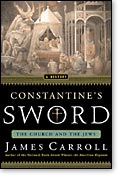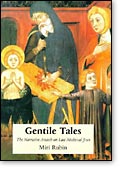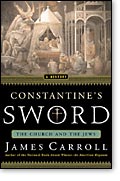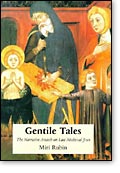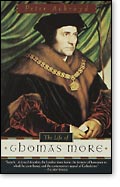Chapter1 | 2 | 3 | 4 | 5 | 6 | 7 | 8 | 9 | 10 | 11 | 12 | 13 | 14 | 15 | 16 | 17 | 18 | 19 | 20 | 21 | 22 | 23
The day Ernetta met Stannie, she realized she’d spent the last 30 years praying for a day like that without even knowing it. All her silent prayers for forgiveness, for assurance that her sufferings would come to right (not be for nothing), and that every stain left on her from Arvin’s cruelty might be washed over and healed—those prayers had all been answered free of charge.
Not many people would have looked at Stannie Colfax that afternoon in his ballcap and baggy shirt and found him beautiful. But Ernetta did. The beauty of that human being sitting in front of her in a living room in Florida knocked her down like a great, sparkling wave. It was a true miracle, him sitting there with her—no less than having an angel appear at the foot of your bed in the middle of the night or seeing somebody raised from the dead, not on TV but in a live church service. To find her son this way was as if she went out to the garden one day in February to look at how the gardenia bushes had held up in the frost and found bright red strawberries bursting from new vines on the fence, already grown up sweet and delicious.
After a few days, the fruit of her search had soured a little. Kind-hearted as she was, she felt Stannie’s cruelty. It wasn’t outright, blunt cruelty like Arvin’s, but it was politeness with a sharp edge. Stannie’s sharpness could go right to your heart. The last two days, whenever he came to check on her at the motel—and he’d come three times and just stayed by the door, smoking—she’d felt him growing sharper, as if he were splintering up the middle. She’d begun to feel afraid of him: her words to him came out in shorter and shorter bursts, like the last drips of ink in a ball-point. She noticed he didn’t want to hear about her life, or about his birth, or about how she came to find him. He didn’t want her asking questions about him, either. If she started onto any of that, he’d turn and walk out, just like Arvin used to do. And what else was there to talk about but him and her?
On Friday afternoon he showed up at the motel looking ragged and sleepy. He needed to do something about her, he said. He was flying back to Washington the next day. She said she didn’t want to be a burden any more, she could even hitchhike back home if she needed to. He looked furious when she said that. He stood for a long time just staring at her like it was the first time he’d ever really seen her. Finally he broke off staring and laughed. He said he’d been thinking about taking her with him to the Academy Awards.
“What would you want to take me for?” she asked him.
“Wouldn’t you like to meet movie stars?”
She shook her head, not even half-understanding him. “I met you now, Stanley. That’s all I care about.”
When she said that, he turned and walked out. But he called later to say he’d decided not to fly back to Washington. He’d hang on to his rental car and drive her home to Alabama on his way up North. She mentioned she had a truck up there; it’d probably been towed. He said he’d take care of it one way or the other. This was the best thing to do.
So here they were Saturday morning stuck for several hours alone in his car on the way up to LeCrane, and she had no idea what to say to him. She’d meant him to come to LeCrane, but not this way, without them getting close first. The inside of his car was black and hot. It smelled like a vaccum cleaner bag after it’d been run for an hour. The light beat down on her face through the sunroof; she didn;t want to complain, but she was sweating. She licked a salty trickle from her upper lip and felt another trickle run into her eye.
“Ernetta,” Stannie said dully. His voice sounded stuffy, like he’d been smoking all night. “I’ll buy you lunch. Where would you like to eat?”
She looked out the windows and saw signs for Panama City Beach. The road was flat and sparkling: there were palm trees everywhere, sprouting like giant pineapples on poles.
“Any place be fine,” she said.
“Arby’s?”
“Oh, Arby’s is too high.”
“High? Define ‘high.'”
“I don’t want you to spend all your money on me, Stannie.”
His sunglasses looked like insect eyes. “We’re stopping at Arby’s. What do you want to eat?”
She thought for a moment. “I reckon I’ll just have a piece of bread and butter.”
They pulled into the Arby’s drive-thru and he ordered her a chicken sandwich, curly fries, and a chocolate shake that had a delicious malt taste to it. She’d never tasted anything as good as that food. She ate it all daintily and self-consciously, with a napkin carefully unfolded on her lap. Meanwhile he pulled out on the highway again and drove along down the road with his face half-buried in a silver food wrapper. He sounded like a hog, chewing. She wondered if he was trying to hide from her in that wrapper. Sometimes he stopped eating to cough or clear his throat, and she couldn’t help but look over at him.
“You need to see a doctor about that congestion,” she said gently.
“What?” He put the wrapper down and she saw that had mayonnaise on his chin; the stubble of his beard poked through the white film.
“You got a terrible cough. You should see a doctor about it.”
“I have allergies,” he said. “That’s why I cough.”
“Why do you smoke, Stannie? I worry about you.”
“Don’t bother.”
She wished she could see his eyes. “A lot of people in my family has died of lung cancer,” she said. The words hung in the air for a while. He didn’t answer.
She put her head back and closed her eyes. When she found she couldn’t sleep, she sat up and watched from the window, noticing the slight rise of the land, the deeper green of the trees and crops as they came closer to home. She began to see familiar spots along the highway: the American Indian Museum where her father used to take her as a little girl; the roadside antique stores where she drove out with her cousin to look for bargains; the cement plant where Arvin worked for two months once. Almost into LeCrane they passed the Catholic church where Arvin got mad and cussed a priest. Then the LeCrane sign and the grocery store and the Dairy Kreem (where she used to scoop ice cream) and then her own church and the very parking lot where Grace Hodge had talked about seeing her picture in the magazine at the doctor’s office. Not so long ago, neither. They passed the gravel road where she and Arvin put a trailer after they got married and tried to settle into normal life as if nothing unusual had happened.
Her time with Stannie was almost at an end now and she was on her own territory, her home ground. She felt afraid, still, but how could she help but talk? There were so many things she’d stored up to say. And what if the chance never came again? She began to talk in a breathy voice about all sorts of things, mostly about Arvin.
She told first about how they got married and he tried to work, but never did any one thing for long. He got jobs as an auto mechanic and then an electrician, till the city told him he couldn’t wire things without a license. Then he got mad and cussed the government and thought about running for office. Arvin could have been the mayor or governor, she said, if he’d wanted to, if he’d really wanted to. He was smarter than any schoolteacher you’d ever meet. He was always inventing things before they came out in the stores—like a record player you could carry around on your back while you listened to headphones and a timer to make the lights to come on in your house if it was dark and you was out.
“Tell me where to turn,” said Stannie’s voice, smoky and cold, from far away.
Ernetta kept her eyes straight ahead and went on talking. That first year after the baby came and went, Arvin was so good to her, it seemed like he just forgot what he done to her before. Such kindness all the sudden—he fixed her breakfast some days; he treated her like a bride, like he wanted to make up for the bad they both had done. At first she couldn’t believe it, and then sometimes at night she started feeling warm all over because of the change in him, and she wondered what another baby might do for them. She hoped she’d get pregnant again.
One day when she was lying in bed and Arvin was gone, she picked up his Bible and started reading where his bookmark was, in the book of Hosea. And it was about this whore named Gomer, which made her laugh at first, because she thought about Gomer Pyle. Then she realized it was like she was reading her own story from Arvin’s point of view. What will I give? God asked Hosea after he made him marry a whore. Wombs that miscarry and breasts that are dry. Suddenly it came back to her: the feel of Arvin’s warm breath on her cheek as he leaned over her on his green chenille bedspread, jerking the ropes tight on her wrists: “You’re an evil slut to want to kill your baby, and God hates you.”
And after the baby came, when she was swollen with milk and there weren’t no little one to drink it, Arvin put his hands right on her breasts and the beautiful milk spurted down his big, stony fingers. Something about seeing her own baby’s milk—a fountain, so white and pure and yet sad as tears—made Arvin’s hands look like great, big, ugly claws. It was the only time she ever hated him, before or since. “Tell me where to turn,” said the voice again from far away.
She went on, telling about how she decided not to have another baby. She didn’t let on to Arvin about the pills Dr. Spears gave her, and before long Arvin didn’t seem interested in being a husband to her, anyway. He applied himself to other things, such as dragging her along on marches. They became professional marchers for a few years, showing up everywhere there was a picket or a clinic sit-in or anything that had to do with abortion. She went to jail twice. She also got to see lots of the country, which she liked, but she wasn’t sure how her and Arvin kept eating without neither of them working a regular job. Arvin took care of everything, though.
To this day she didn’t know how he’d managed their finances, but there wasn’t one thing, not one thing, about which she could honestly say, “No, Arvin couldn’t do that.” Arvin could and would do anything. He’d even worked in Korea for the CIA as a paid assassin. So maybe that was it. Maybe even back in the marching days Arvin killed people on the side for money, just to keep him and her driving around the country in their truck that said “Stop Abortion Now” and had a pair of sleeping bags under the shell in the back along with plenty of towelettes for sanitary purposes and a pile of signs tied up in the corner.
Within a few more years, Arvin started killing people on a regular basis, but by then he’d left her behind. She flat out told him one day she wouldn’t do anything that hurt nobody.
“I know what you’re doing,” she said. “I’m against abortion, but I don’t think God wants us going around lighting fires and setting off bombs.”
“I knew you’d say that,” he told her in a voice like rocks being rubbed together. “I never forgot what you tried to do before. You haven’t changed a bit. You’re still just a slut.”
And that was it, he was gone. At first she waited, expecting he’d come back and she’d have to get used to him again. And then she found herself getting her courage back, peeking up out of her old life like a bulb that’s been lying buried all winter, and when the cold is gone, it slowly sneaks up, it lifts up little buds and it starts to grow toward the light. That’s just how it was for her, just how it was.
She’d been talking and crying, almost forgetting that she was talking to somebody. She wiped her face and looked over at Stannie. He looked gloomy, all hunched down near the wheel. His shirt was crumpled up around the back of his neck.
“I’m sorry,” she said.
“Where are we?” he asked, in a voice that sounded more like Arvin’s than ever. “Where’s your frigging house?”
“We’ve gone way past my street.”
“How far past?”
“About six or seven miles. Turn around.”
It was a five-lane highway. He swerved left and made a quick u-turn. Another car blew its horn as they jerked out of its way.
“Shit,” he said. “All right, where is it?”
She pointed ahead, trembling. “Just keep going, Stanley. I’ll show you this time.”
Except to give directions, she didn’t talk again until they were in her own driveway, parked in the shade of a blossoming orange tree. A white flower drifted down and settled on the sunroof. She wondered if he’d come in or just drop her off, here. She wondered if she’d ever see him again.
“I don’t have no groceries,” she said softly, “but I could give you a glass of ice water.”
He opened his door and the car made a little ringing noise until he’d got out and shut it again. She got out after him and rushed ahead to open the door. The house smelled so musty.
“Just a minute,” she said. She drew back the front curtains, opened a window, turned on a fan. “I wished I’d knowed you was coming. I’d have cleaned up.”
He looked so uncomfortable. She felt sorry for him. She wished she could change all this! There was no prayer in the world to convince God to take you back in time and do it all over different. Stannie came into her living room and his eyes darted around, like he was looking for something.
“Did you want to see a picture of him?” she asked.
“Who?”
“Your father.”
His forehead wrinkled up for a second, and then he laughed.”
“No.”
“He said you had a right to be born. He said you might grow up to be somebody and it weren’t our right to stand in your way.” She paused. “Would you like some ice water?”
“No.” He suddenly looked up. “Do you have money for groceries, Ernetta? What do you live on, anyway?”
“Oh, I got plenty.”
He raised a dark eyebrow but didn’t say anything. He jingled his keys.
“Stannie,” she said, “will you call me? I don’t have no right to ask, but I’d like to hear from you now and again. And what I asked you about—”
He shook his head. “Can’t find a terrorist for you.”
“What if he kills somebody else?”
“Call the FBI. Or maybe the CIA. Maybe he’s still working for them.”
“I wish you could do it. But if you can’t—”
“No,” he said slowly, and then took in a breath through his nostrils. “Well, Ernetta, it’s been—”
“Goodbye, Stanley,” she said. “I’m real glad I got a chance to see you once.”
“Take care of yourself.” He coughed and turned slowly to the door, then went back out to his car. She could hear his footsteps on the porch outside. Then the engine of his car. This was why, she thought. This was maybe why people had abortions in the first place. Because whether you wanted to or not, you put your heart into a child. You had no choice about it; it was just instinct. And if things didn’t work out—if that child turned its back on you or maybe even if you turned your back on the child, then your heart went with it, and you were a hollow person after. Love was a killing thing: it was no wonder people wanted to end it sometimes before it even got started.
Copyright © 2001 by the author or Christianity Today/Books & Culture Magazine.Click here for reprint information on Books & Culture.


